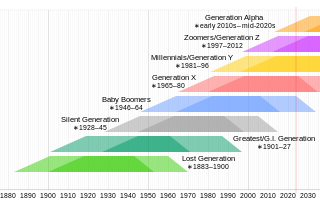Related Research Articles

Developmental psychology is the scientific study of how and why humans grow, change, and adapt across the course of their lives. Originally concerned with infants and children, the field has expanded to include adolescence, adult development, aging, and the entire lifespan. Developmental psychologists aim to explain how thinking, feeling, and behaviors change throughout life. This field examines change across three major dimensions, which are physical development, cognitive development, and social emotional development. Within these three dimensions are a broad range of topics including motor skills, executive functions, moral understanding, language acquisition, social change, personality, emotional development, self-concept, and identity formation.

Generation X is the demographic cohort following the Baby Boomers and preceding Millennials. Researchers and popular media often use the mid-1960s as its starting birth years and the late 1970s as its ending birth years, with the generation being generally defined as people born from 1965 to 1980. By this definition and U.S. Census data, there are 65.2 million Gen Xers in the United States as of 2019. Most of Generation X are the children of the Silent Generation and early Baby Boomers; Xers are also often the parents of Millennials and Generation Z.

Millennials, also known as Generation Y, are the demographic cohort following Generation X and preceding Generation Z. Researchers and popular media use the early 1980s as starting birth years and the mid-1990s to early 2000s as ending birth years, with the generation typically being defined as people born from 1981 to 1996. Most Millennials are the children of Baby Boomers and older Generation X. In turn Millennials are often the parents of Generation Alpha.
In medicine and the social sciences, a young adult is generally a person in the years following adolescence, sometimes with some overlap. Definitions and opinions on what qualifies as a young adult vary, with works such as Erik Erikson's stages of human development significantly influencing the definition of the term; generally, the term is often used to refer to adults in approximately the age range of 18 to 40 years, with some more inclusive definitions extending the definition into the early to mid 40s. The young adult stage in human development precedes middle adulthood.

Erik Homburger Erikson was a Danish German-American child psychoanalyst known for his theory on psychosocial development of human beings. He coined the phrase identity crisis.
Erikson's stages of psychosocial development, as articulated in the second half of the 20th century by Erik Erikson in collaboration with Joan Erikson, is a comprehensive psychoanalytic theory that identifies a series of eight stages that a healthy developing individual should pass through from infancy to late adulthood.
A midlife crisis is a transition of identity and self-confidence that can occur in middle-aged individuals, typically 45 to 64 years old. The phenomenon is described as a psychological crisis brought about by events that highlight a person's growing age, inevitable mortality, and possible lack of accomplishments in life. This may produce feelings of intense depression, remorse, and high levels of anxiety; or the desire to achieve youthfulness, make drastic changes to their current lifestyle, or change past decisions and events. Studies on midlife crises show that they are less common than popularly believed, according to Vaillant (2012): in his 75-year longitudinal study on adult development, he found midlife crises were rare experiences for people involved in the study. The term was coined by Elliott Jaques in 1965.
In psychology, identity crisis is a stage theory of identity development which involves the resolution of a conflict over eight stages of life. The term was coined by German psychologist Erik Erikson.
In Western culture the Boomerang Generation refers to the generation of young adults graduating high school and college in the 21st century. They are so named for the percentage of whom choose to share a home with their parents after previously living on their own—thus boomeranging back to their parents' residence. This arrangement can take many forms, ranging from situations that mirror the high dependency of pre-adulthood to highly independent, separate-household arrangements.

Alexandra Robbins is a journalist, lecturer, and author. Her books focus on young adults, education, and modern college life. Five of her books have been New York Times Bestsellers.
James E. Marcia is a clinical and developmental psychologist. He taught at Simon Fraser University in British Columbia, Canada and the State University of New York at Buffalo in Upstate New York.
Emerging adulthood, early adulthood, or post-adolescence refers to a phase of the life span between late adolescence and early adulthood, as initially proposed by Jeffrey Arnett in a 2000 article from the American Psychologist. It primarily describes people living in developed countries, but it is also experienced by young adults in wealthy urban families in the Global South. The term describes young adults who do not have children, do not live in their own homes, and/or do not have sufficient income to become fully independent. Arnett suggests emerging adulthood is the distinct period between 20 and 29 years of age where young adults become more independent and explore various life possibilities.
Adult development encompasses the changes that occur in biological and psychological domains of human life from the end of adolescence until the end of one's life. Changes occur at the cellular level and are partially explained by biological theories of adult development and aging. Biological changes influence psychological and interpersonal/social developmental changes, which are often described by stage theories of human development. Stage theories typically focus on "age-appropriate" developmental tasks to be achieved at each stage. Erik Erikson and Carl Jung proposed stage theories of human development that encompass the entire life span, and emphasized the potential for positive change very late in life.
Quarterlife is an American web series, also briefly an NBC television series in 2008, created by Marshall Herskovitz and Edward Zwick, the creators of Thirtysomething and Once and Again, and producers of My So-Called Life. The show is about a group of twenty-something artists who are coming of age in the digital generation.
In Iran, the Burnt Generation is the generation born between roughly 1966 and 1988, having experienced the Iranian Revolution, Iran–Iraq War, and political or social consequences of these such as the Iran hostage crisis, the 1980 Iranian Embassy Siege, the Iranian Cultural Revolution, 1988 executions of political prisoners, the 1989 fatwa against Salman Rushdie, and the Islamic revival, as children, teenagers and later as young adults. These events proved fundamental in deciding the very poor prospects and pessimistic outlook of this generation as they entered the workforce in Iran at the end of the 1980s, and throughout the 1990s.
Stage-crisis view is a theory of adult development that was established by Daniel Levinson. Although largely influenced by the work of Erik Erikson, Levinson sought to create a broader theory that would encompass all aspects of adult development as opposed to just the psychosocial. This theory is characterized by both definitive eras as well as transition phases, whose purpose is to facilitate a smooth transition out of one era and into the next. According to his theory, various developmental tasks must be mastered as one progresses through each era; pre-adulthood, early adulthood, middle adulthood, and late adulthood. Crises are also experienced throughout the lifecycle and occur when one become burdened by either internal or external factors, such as during the midlife crisis that occurs during the midlife transition from early adulthood to middle adulthood.
The Strauss–Howe generational theory, devised by William Strauss and Neil Howe, describes a theorized recurring generation cycle in American history and Western history. According to the theory, historical events are associated with recurring generational personas (archetypes). Each generational persona unleashes a new era lasting around 20–25 years, in which a new social, political, and economic climate (mood) exists. They are part of a larger cyclical "saeculum". The theory states that a crisis recurs in American history after every saeculum, which is followed by a recovery (high). During this recovery, institutions and communitarian values are strong. Ultimately, succeeding generational archetypes attack and weaken institutions in the name of autonomy and individualism, which eventually creates a tumultuous political environment that ripens conditions for another crisis.

"Stressed Out" is a song written and recorded by American musical duo Twenty One Pilots. Produced by Mike Elizondo and recorded at studios in Los Angeles and London, it was released as a promotional single from their fourth studio album, Blurryface (2015), on April 28, 2015, through Fueled by Ramen. The song later impacted US contemporary hit radio as the album's fourth official single on November 10. Elizondo initially took issue with the nature of the song's lyrical content, but relaxed after lead vocalist and songwriter Tyler Joseph explained the larger album concept.

Jean Marie Twenge is an American psychologist researching generational differences, including work values, life goals, and speed of development. She is a professor of psychology at San Diego State University, author, consultant, and public speaker. She has examined generational differences in work attitudes, life goals, developmental speed, sexual behavior, and religious commitment.

Taylor Cameron Upsahl, known mononymously as Upsahl, is an American singer and songwriter. Her debut album, Lady Jesus, was released in 2021.
References
- ↑ "Quarterlife crisis". Collins English Dictionary. Retrieved 3 September 2018.
- ↑ Jessica Girdwain (12 March 2013). "How to Survive a Quarter-Life Crisis". SELF.
- 1 2 "The age you're most likely to have a quarter-life crisis". The Independent. Rachel Hosie. 15 November 2017. Retrieved 3 September 2018.
- ↑ Goldstein, Meredith (8 September 2004). "The quarter-life crisis". The Boston Globe . Retrieved 5 September 2007.
- ↑ Erikson, Erik H. (1968). Identity: Youth and Crisis . New York: W. W. Norton.
- ↑ Dawodu, Micheal (29 August 2020). "Overcoming Quarter Life Crisis As a Nigerian". insight.ng. Retrieved 23 December 2020.
- ↑ Shaputis, Kathleen (2003). The Crowded Nest Syndrome : Surviving the Return of Adult Children. Olympia: Clutter Fairy. ISBN 0972672702.
- ↑ Tom Anderson. Debt-Locked: Student Loans Force Millennials to Delay Life Milestones NBC News.com, accessed 3 April 2018
- ↑ Lou Carlozo (9 May 2016). Student Loan Debt: The Invisible, Incredible Drain on Investment. US News & World Report, accessed 3 April 2018
- ↑ Scott, A. O. (23 October 2014). "Some People Persist in Taking an Endless Timeout From Adult Life". The New York Times .
- ↑ "Berklee Today".
- ↑ "Landslide by Fleetwood Mac Songfacts".
- ↑ "20 Something, SZA". Genius Media Group, Inc.
- ↑ "Quarter-life Triumph by Judah & the Lion on Billboard". Billboard .
- ↑ "INTERVIEW: UPSAHL releases new EP 'Young Life Crisis': "This EP Is the most honest and vulnerable I've gotten with any of my songs...I'm hoping people relate to it in some way, shape or form."".
- ↑ "Taylor Bickett – QUARTER LIFE CRISIS Lyrics". Genius Lyrics. 14 October 2022. Retrieved 12 May 2023.
- ↑ Dunworth, Liberty (10 August 2023). "Baby Queen announces debut album 'Quarter Life Crisis' and new tour dates". NME. Retrieved 27 August 2023.